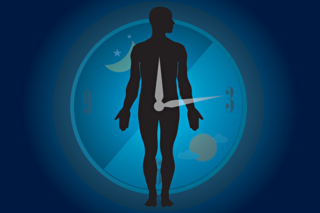Circadian Rhythm
10 Early Warning Signs of Circadian Rhythm Disruption
When we are most at risk for circadian rhythm "drift" and what to do about it.
Posted November 4, 2022 Reviewed by Davia Sills
Key points
- Sleep and circadian rhythm disruption (SCRD) coincides with key areas of health.
- There is a cost to overriding the "deep biology" and wisdom of our body clocks.
- Well-timed activities and light exposure can ensure proper entrainment and prevent worsening disease and mental illness.

Sleep problems and other circadian rhythm disruptions are intimately and inextricably linked. A circadian neuroscientist, Dr. Russell Foster, and his team developed the term SCRD as a shorthand for sleep and circadian rhythm disruption of all kinds that underpin major problems in every key area of health1.
Sleep is only one class of biological rhythms, albeit a big one, that can be disrupted and connected with illnesses of all sorts. Mood, concentration, energy, physical performance, inflammation, addiction, and many other human experiences have peaks and valleys throughout the day that stem from patterned biology that attempts (generally with great success) to predict and deliver the resources we need—just enough, just in time. Although genes are not as fixed as once thought to be and, in fact, upload and download in relationship to our environments, this is not an indication that we can override our naturally occurring biological rhythms without consequence.
In his new book, Life Time, Foster writes, “These two interlinked and balanced systems define much of our ability to function, and if we work against this ‘deep biology,’ we compromise every aspect of our health.” (p 71).
When We Are Most at Risk
The most glaring SCRDs come at major life changes that often include both major biological shifts and sleep deprivation—such as postpartum, puberty, and menopause, where the risk of depression for women dramatically increases—or such as retirement, a new job, or another stressor that often combines a schedule change and stressful transition.
SCRD may also appear after illness, travel, and relocation—especially if it is to another time zone or from working night or swing shifts. (Research shows that 97 percent of people do not adjust to night-shift.) SCRD may greatly exacerbate the development of mood disorders and other mental health problems, like bipolar disorder and schizophrenia, that are marked by severe sleep problems—especially following traumatic events. Even a partial improvement of SCRD has been shown to reduce the severity of symptoms of mental illness. (For example, Freeman et al. found that treating sleep problems can prevent psychotic episodes (2017)2.
More subtle shifts occur as well and creep up on us as we age when our sleeping patterns and metabolic requirements shift. These less visible biological rhythms can become disrupted over time unless we intervene. Examples include:
- Blood sugar disruption that leads to diabetes
- Fat storage rhythm disruption that leads to weight gain and obesity
- Immune suppression that leads to vulnerability to illness and cancer
- Digestive hormone and motility changes that lead to gastrointestinal problems
- Blood vessel constriction and dilation, fatty deposits, and blood flow changes that trend toward cardiovascular disease
- Memory storage and recall that are directly impacted by cortisol and poor sleep quality
- Cortisol and adrenaline rhythm shifts with stress that lead to fatigue and all of the above
- Dopamine shifts associated with addiction3
- Heart rate variability (HRV) frequency changes that are also reflected in diseases of all sorts
Early Warning Signs
Early warning signs of the drift into SCRD and potential resulting illnesses are key to intervening early. I adapted these 10 questions from Foster’s work to identify the slide toward SCRD-related disorders:
- Do you feel sleepy, unfocused, or irritable during the day?
- Are you dependent upon an alarm clock or another person to get out of bed?
- Do you sleep in later than usual on free days and holidays?
- Do you take a long time to wake up and feel alert?
- Do you just start feeling awake and in focus in the evening or just before bedtime?
- Do you feel you need a mid-afternoon nap to function properly?
- Do you have difficulty concentrating or exhibit impulsive behaviors?
- Do you crave caffeine and sugary drinks and snacks?
- Do you seem to get sick easily and frequently?
- Have you been experiencing or have others suggested you have had an increase in worry, anxiety, irritability, mood swings, or depression?
If you answered yes to several of these symptoms, you may be struggling with SCRD.
Our invisible biological rhythms are constantly interacting with our behaviors and environment. Everything we do affects how we feel and how well we perform a task. It is the precise understanding of how these internal clocks operate that continues to unfold and offers specifics about what behavior changes to make, how to change them, and, most importantly, when. The ecology of health and resilience depends on our circadian rhythms and the synchronization of many peripheral clocks that are too frequently unknown or ignored.
Entraining Our Body Clocks
Regular behavioral anchors help many daily functions peak and rest at their natural time of day. Well-timed light exposure, eating, and exercise at the optimal time of day for your chronotype are just a few of the behaviors that help entrain biological rhythms to recover from and prevent illness. Aligning digestion and cellular metabolism, cognitive functions such as attention, memory, and insight, and physical coordination and strength are key to feeling well (as I teach in The Art of Sleep workshop).
The research is complex (and fascinating), but following the known science of biological rhythms and attuning to your own natural ebbs and flows can guide you to a personal daily plan that befriends these rhythms and maximizes health, mood, concentration, and sense of well-being.
References
1. Foster, R. (2022). Life Time: Your Body Clock and Its Essential Role in Good Health and Sleep. Yale University Press.
2. Freeman, D., Sheaves, B., Goodwin, G. M., et al. (2017). The effects of improving sleep on mental health (OASIS): a randomised controlled trial with mediation analysis. The Lancet. Psychiatry, 4(10), 749–758. https://doi.org/10.1016/S2215-0366(17)30328-0
3. Sterling, P. (February 2020). What is Health? Allostasis and the Evolution of Human Design. Cambridge, Massachusetts: The MIT Press.
The Art of Sleep, workshop, Mercy Center Auburn, January 6-8, 2023, and Rhythms of Life: Living in Flow with Our Essential Body Clocks workshop, TBD.


